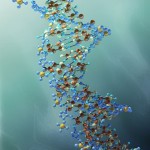 Cisplatin is a well known chemotherapy drug used to treat a range of cancers. While the drug can be an effective treatment there are notable unwanted side-effects, which can include nausea, vomiting, kidney damage and loss of hearing. This new research from Leeds University by Charlotte Willans et al. details the activity of a range of silver complexes containing N-heterocyclic carbene (NHC) ligands which show comparable and even enhanced cytotoxicity compared to cisplatin. As the compounds don’t contain platinum they are likely to be less toxic and therefore exhibit fewer and less severe side-effects.
Cisplatin is a well known chemotherapy drug used to treat a range of cancers. While the drug can be an effective treatment there are notable unwanted side-effects, which can include nausea, vomiting, kidney damage and loss of hearing. This new research from Leeds University by Charlotte Willans et al. details the activity of a range of silver complexes containing N-heterocyclic carbene (NHC) ligands which show comparable and even enhanced cytotoxicity compared to cisplatin. As the compounds don’t contain platinum they are likely to be less toxic and therefore exhibit fewer and less severe side-effects.
The team synthesised a series of monodentate, bidentate and macrocyclic cationic silver bis(NHC) complexes and tested their activity with cell lines of breast and colon cancer (MCF7 and DLD1 lines respectively). They found that the bidentate complexes showed enhanced cytotoxicity over the monodentate and macrocyclic ligands, which were similar to cisplatin. As yet the exact mechanisms of action are still unclear but are likely linked to the stabilities of the complexes.
For more information about this exciting research you can download the article which is free to access for 4 weeks. You can also keep up to date with all the latest news in inorganic chemistry by following us on twitter or signing up to the Dalton Transactions e-alert service.
Enhanced cytotoxicity of silver complexes bearing bidentate N-heterocyclic carbene ligands
Charlotte E. Willans, Diana C F Monteiro, Roger M Phillips, Benjamin D Crossley and Jake Fielden
Dalton Trans., 2012, Accepted Manuscript
DOI: 10.1039/C2DT12399A
Also of interest from the collection ‘Highlights in Chemistry’
Therapeutic applications of gold complexes: lipophilic gold(III) cations and gold(I) complexes for anti-cancer treatment
Chi-Ming Che and Raymond Wai-Yin Sun
Chem. Commun., 2011, 47, 9554-9560
DOI: 10.1039/C1CC10860C, Highlight











